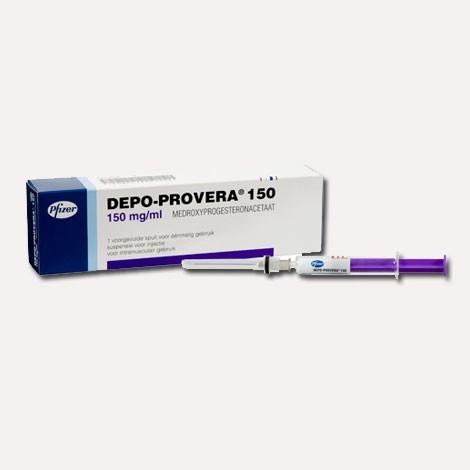Depo Provera (Medroxyprogesterone acetate)
What is Depo-Provera?
Depo-Provera (medroxyprogesterone) is a form of progesterone, a female hormone that prevents ovulation (the release of an egg from an ovary). Medroxyprogesterone also causes changes in your cervical mucus and uterine lining, making it harder for sperm to reach the uterus and harder for a fertilized egg to attach to the uterus.
Depo-SubQ Provera 104 is used as contraception to prevent pregnancy. It is also used to reduce pain caused by endometriosis.
Depo-Provera injection is used to ease pain and other symptoms in women with metastatic uterine or kidney cancer. This medication is not a cure for these conditions.
Important information
Depo-Provera can cause birth defects. Do not use if this medicine if you are pregnant. Tell your doctor right away if you become pregnant during treatment, or soon after you stop using this medicine.
You should not use Depo-Provera if you have unusual vaginal bleeding, liver disease, or a history of breast cancer, heart attack, stroke, or blood clot.
You should not use Depo-Provera for longer than 2 years. Medroxyprogesterone may cause bone loss (osteoporosis) when used over long periods of time.
Depo-SubQ Provera 104 will not protect you from sexually transmitted diseases - including HIV and AIDS. Using a condom is the only way to protect yourself from these diseases.
How should I use Depo-Provera?
Depo-Provera is given by intramuscular injection once per week. If improvement is noted after a few weeks or months of treatment and the disease appears stabilized, it may be possible to maintain improvement using one injection per month.
Depo-SubQ Provera 104 is given by subcutaneous injection once every 3 months (12 to 14 weeks).
Depo-SubQ Provera 104 is given by a healthcare provider. For conditions treated with Depo-Provera injection, you may be shown how to use injections at home. Do not self-inject this medicine if you do not fully understand how to give the injection and properly dispose of used needles and syringes.
Use a disposable needle and syringe only once. Follow any state or local laws about throwing away used needles and syringes. Use a puncture-proof "sharps" disposal container (ask your pharmacist where to get one and how to throw it away). Keep this container out of the reach of children and pets.
You may have breakthrough bleeding while using Depo-Provera. Tell your doctor if this bleeding continues or is very heavy.
This medicine can cause unusual results with certain medical tests. Tell any doctor who treats you that you are using Depo-Provera.
Your doctor will need to see you on a regular basis while you are using this medicine. Do not miss any appointments.
Store at room temperature away from moisture and heat.
What happens if I miss a dose?
Call your doctor for instructions if you miss a dose of this medicine.
What happens if I overdose?
Seek emergency medical attention or call the Poison Help line at 1-800-222-1222.
What should I avoid while using Depo-Provera?
This medication will not protect you from sexually transmitted diseases--including HIV and AIDS. Using a condom is the only way to protect yourself from these diseases.
This medicine can pass into body fluids (urine, feces, vomit). For at least 48 hours after you receive a dose, avoid allowing your body fluids to come into contact with your hands or other surfaces. Caregivers should wear rubber gloves while cleaning up a patient's body fluids, handling contaminated trash or laundry or changing diapers. Wash hands before and after removing gloves. Wash soiled clothing and linens separately from other laundry.
Depo-Provera side effects
Get emergency medical help if you have signs of an allergic reaction to Depo-Provera: hives; difficulty breathing; swelling of your face, lips, tongue, or throat.
Call your doctor at once if you have:
- menstrual periods that are heavier or longer than normal;
- severe pain in your lower stomach;
- swelling in your face, or your hands, ankles, and feet;
- pain, bleeding, or oozing (pus) where the injection was given;
- symptoms of depression (sleep problems, weakness, mood changes);
- liver problems - nausea, upper stomach pain, itching, tired feeling, loss of appetite, dark urine, clay-colored stools, jaundice (yellowing of the skin or eyes);
- signs of a stroke - sudden numbness or weakness (especially on one side of the body), sudden severe headache, slurred speech, problems with vision or balance;
- signs of a blood clot in the lung - chest pain, sudden cough, wheezing, rapid breathing, coughing up blood; or
- signs of a blood clot in your leg - pain, swelling, warmth, or redness in one or both legs.
Common Depo-Provera side effects may include:
- changes in your menstrual periods;
- swelling, weight gain (especially in your face);
- headache, dizziness;
- mild stomach pain; or
- feeling weak, tired, or nervous.
This is not a complete list of side effects and others may occur. Call your doctor for medical advice about side effects. You may report side effects to FDA at 1-800-FDA-1088.
What other drugs will affect Depo-Provera?
Tell your doctor about all your current medicines and any you start or stop using, especially:
- bosentan;
- griseofulvin;
- St. John's wort;
- an antibiotic or antifungal medicine;
- HIV or AIDS medicine;
- seizure medicine; or
- sleep medicine (to treat insomnia).
This list is not complete. Other drugs may interact with medroxyprogesterone, including prescription and over-the-counter medicines, vitamins, and herbal products. Not all possible interactions are listed in this medication guide.















0 comments:
Post a Comment